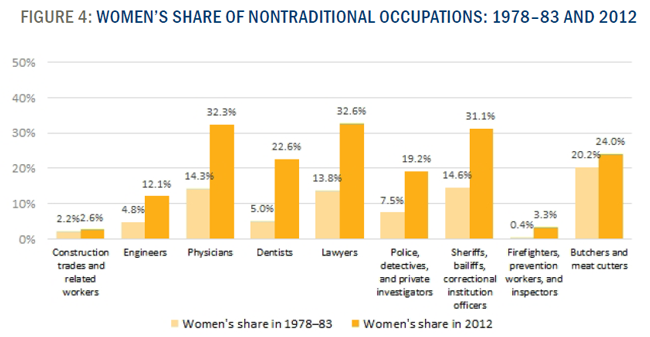“I love my trade very much. I love watching nothing become something.”
— Mary Battle, quoted in “Women in Construction: Still Breaking Ground.”
Sometimes there are glass ceilings so far from our field of focus that we fail to see them at all. A report published by the National Women’s Law Center last month analyzes data collected on women working in the construction industry. The report reveals pervasive sexual harassment, blatant gender stereotypes, and hostility toward women that has served to keep the share of women in this field under 3% for over three decades. This chart, taken from page 6 of the report, demonstrates that, whereas the share of women in “non-traditional” occupations such as firefighting, police work, and corrections has more than doubled since 1983, the percentage of women in construction trades has increase by a mere 0.4%.

The report captures the stories of women who, drawn in by the love of their trades such as welding or masonry, are nearly forced out of their profession by groping, assault, harassment, lack of mentoring and lack of employment opportunities. The report delivers a nearly unbelievable statistic: the Department of Labor has reported that
88% of women construction workers experience sexual harassment at work, compared to 25% of women in the general work force.
[1] It also tells of a federal construction contractor in Puerto Rico that was found to not provide restroom facilities for women on the worksite, forcing them instead to relieve themselves outside in the open.
[2]
The report offers some great suggestions as to ways to address the problem, including stronger agency oversight, regulation, and incentives. But I fear that so much of the reason that we’ve made so little progress toward gender equality in the construction industry is that too many people (until recently, myself included) just don’t see this as a problem.
For example, incensed by what I read, I recounted the contents of the report to friends and family. Their reactions ranged from a sarcastic “did you find that surprising?” to disbelief that women would actually want to work in construction and trades. The trades are seen, after all, as physical, dirty labor – a haven of work boots and big trucks. In such a male dominated industry, it is accepted that “boys will be boys.” And this isn’t seen as a problem since there are so few women in the industry anyway.
But as a former Air Force officer and graduate of a military academy, I recognize that I was only able to pursue my own military dreams due to social change and the pioneering women before me. I am forever indebted to those who challenged traditional gender roles and proved to the world that women make great military professionals, and that young girls dream of becoming fighter pilots and soldiers, too. The continuing evolution and inclusion of women in America’s military demonstrates that it is absurd to generalize about what women want to do (or will be fulfilled doing). It is especially sad to further perpetuate gender myths by bullying and harassing the few women who are still ambitious enough to pursue fields like construction. We just don’t know what future generations of women will want if we don’t make certain careers into viable options.
So I am urging all of us to pay more attention to glass ceilings we can’t always personally relate to, and to remember the insidious influence of stereotypes. I ultimately believe that even if we have women in the highest levels of politics, the military, and the corporate world, we haven’t succeeded if the little girl that loves swinging a hammer – who loves creating something out of nothing – can’t grow up to realize her ambitions.
__________________________________
[1] Page 8
[2] Page 10








